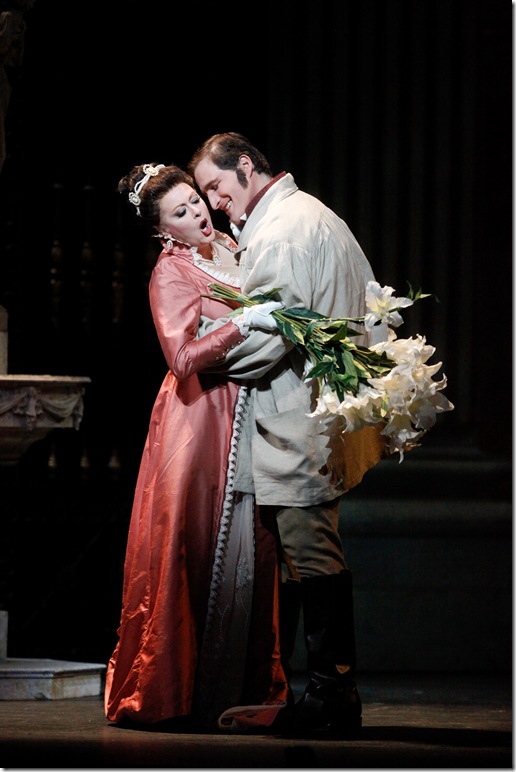Good singing can get an opera audience past uninspired acting, but when it comes to the heroine of Giacomo Puccini’s Tosca, it’s best to have someone who can do both well.
And on Friday night, Palm Beach Opera did.
In the Italian soprano Chiara Taigi, who opened its current run of Puccini’s “shabby little shocker” from 1900, Palm Beach Opera had an actress whose Floria Tosca was believable and sympathetic, passionate and action-dominating, and a singer whose mature, dark soprano had power, range and stamina.
Taigi was the focus of a very traditional production (set, as it’s supposed to be, in the Rome of 1800) that used the company’s modest resources shrewdly, and that absorbed its audience from the first moments and held them fast until the end. One excellent reason for that was Taigi’s fine performance in Act II, with a Vissi d’arte of high emotion and musicality, and in which her nervous jitters after stabbing Scarpia were nicely appropriate (if the subsequent throwing around of papers was a little overdone).
But she was an excellent Tosca throughout, making the most of a star vehicle whose play parent increased the luster of none other than Sarah Bernhardt. Taigi’s acting and musical chops were strong enough even to overcome moments of vocal shrillness on top and some cracking in the lower reaches; these imperfections actually made her performance that much more credible and enjoyable.
As Cavaradossi, tenor Riccardo Massi did a respectable job, and he has a large, warm voice that at its best is quite pleasant to listen to. He sounded somewhat strained in the top of his range, but in a way that suggested an engine not firing on all cylinders rather than one pushed to the breaking point.
His Recondita armonia and E lucevan le stelle were carefully and capably sung, but they lacked a strong sense of passion, and E lucevan in particular didn’t have the feeling of desperation and extravagant emotion it needs to be a show-stopper.
Claudio Sgura, as Scarpia, has a good, solid baritone voice, and he was effective enough in the second act to earn plenty of hearty boos at the curtain call. He was less impressive in the closing of the first act, when he needs to become the second center of the melodrama, especially in the great Te Deum scene that ends it.
Partly because of Massimo Gasparon’s staging, which pushed him over to the side to make room for the church procession, Sgura, who sounded underpowered, wasn’t able to give us the skin-crawling sense of a man whose lusts for flesh and violence are pushing him over the edge, and who knows it.
The first act’s best work came from a minor role, that of the sacristan, as sung by the Italian baritone and character specialist Matteo Peirone. Seen here last month as a very fine Don Alfonso in Mozart’s Cosi fan Tutte, Peirone (who probably makes an excellent Gianni Schicchi) was equally good this time around as the fussy caretaker, singing with strength and offering a winning portrayal of a flustered, comic Everyman.
Also good in a minor role was bass Matthew Burns as Angelotti. He has a deep voice of real quality, and it’s regrettable that Puccini’s mastery of the theater led him to cut out so much backstory. A few more comradely minutes of Angelotti would have given us more of Burns’ singing to listen to.
Three of the company’s Young Artists – Evanivaldo Correa as Spoletta, Kenneth Stavert as Sciarrone, and Greta Ball as the shepherd – sang well, with Correa’s sharp-edged tenor making a good vocal contrast in his colloquies with Sgura. Good work was also to be had from the chorus in the Te Deum and the offstage cantata in Act II.
Conductor Bruno Aprea, like Taigi a native of Rome, led a brisk, powerful reading of this rich score, building steadily and surely to the conclusion of Act I, and giving the big Act II theme associated with the knife that Tosca will use to kill Scarpia a ferocious reprise after the black deed is done, casting a real sense of momentousness over the scene on stage. Except for intonation problems in the cello quartet during Act III, the orchestra played wonderfully, and indeed its performance was one of the high points of Friday evening.
Director Gasparon, who made good use of the Sarasota Opera set in constructing effective tableaux, sacrificed some of the drama’s effectiveness in Act III with a staging choice that had Cavaradossi singing the sweetness of Tosca’s hands on the other side of the stage from her. Much of their action together saw them singing while apart, which possibly was meant to focus on each character’s individual anguish, but which didn’t make much sense dramatically, especially after the heat of Act II.
His staging of the shepherd’s song in that act, which had Ball sitting on a parapet serenading soldiers, didn’t work well, either, since the song just adds a moment of Roman-dawn coloring, and needs to be a drive-by song, not a spotlight moment.
Tosca will be repeated tonight at the Kravis Center beginning at 7:30 p.m. Soprano Tiffany Abban stars as Tosca, with Warren Mok as Cavaradossi and Stephen Powell as Scarpia. Chiara Taigi returns for the 2 p.m. Sunday performance, and Abban is back for the 2 p.m. Monday show. Tickets range from $23-$175. Call 833-7888 or visit www.pbopera.org.
